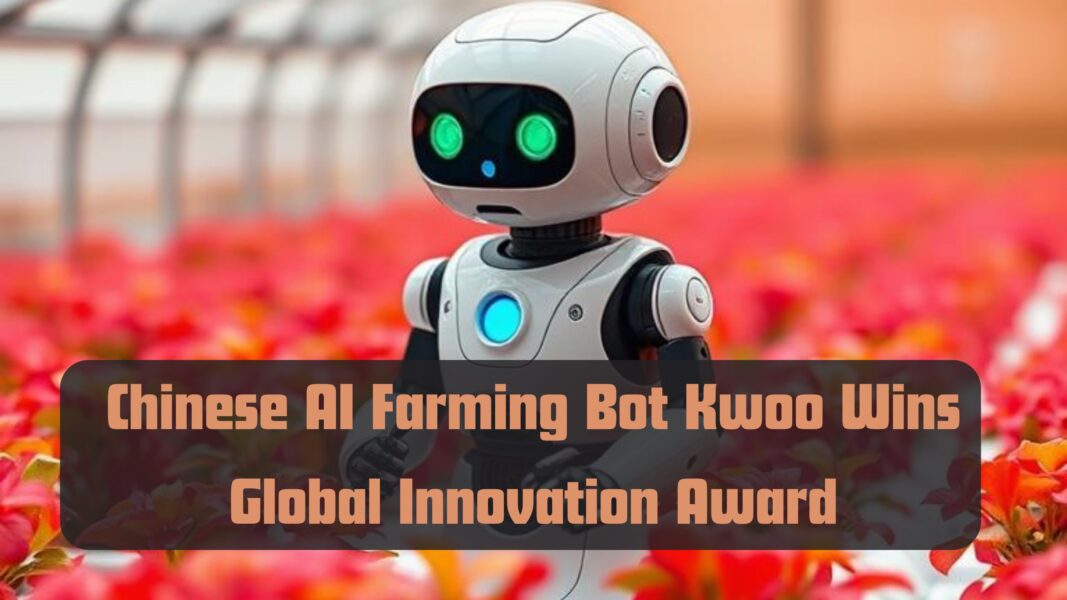A breakthrough in agricultural technology, the AI farming bot Kwoo, developed by a research team at the Harbin Institute of Technology in Heilongjiang province, has received the prestigious Diamond Natural Earth Award at the 2024 British Innovation and Technology Show. This award highlights the model’s excellence in leveraging artificial intelligence for precision agriculture, crop management, pest control, and yield optimization.

The Development of Kwoo: A Game-Changer in Agriculture
The Kwoo AI model is the result of years of rigorous research and development by a 150-member team, including faculty members, postgraduate researchers, and undergraduate students. While senior researchers focused on the AI’s machine learning algorithms and agricultural data analytics, 26 undergraduate students dedicated their efforts to developing Android, iOS, web, and WeChat mini-programs for seamless farmer integration.
Agricultural modernization has been evolving from mechanization to automation and now towards AI-driven intelligence. Kwoo embodies this shift by combining big data, cloud computing, computer vision, and natural language processing to enhance agricultural productivity and sustainability.
Also Read: Perplexity vs. ChatGPT: Unveiling the Best AI Chatbot Tool
AI-Powered Precision AI Farming Bot: How Kwoo Works
Professor Jiang Jingchi, a key researcher in the project, emphasizes that Kwoo is designed to enhance agricultural efficiency through intelligent decision-making tools. Its core functions include:
- Image Recognition & Environmental Data Monitoring: Kwoo detects crop diseases, pest infestations, and soil health by analyzing images captured by drones and IoT sensors.
- Crop Growth Cycle Prediction: By analyzing past growth patterns, soil conditions, and climate factors, Kwoo predicts optimal planting and harvesting times.
- Smart Pest Risk Assessment & Disease Control: The AI provides real-time suggestions on combating pests and diseases, reducing reliance on chemical pesticides.
- Climate & Disaster Forecasting: It assesses potential risks from climate change, droughts, and storms, allowing farmers to take preventive measures.
- Yield Optimization & Cost Reduction: Farmers using Kwoo have reported a 5% increase in yield and a 10% reduction in production costs.
Kwoo’s Official Recognition & Expanding Applications
On October 23, 2024, Kwoo was officially registered by the Cyberspace Administration of China, making it China’s first approved AI-powered agricultural model. This approval came after rigorous testing in capability, information filtering, and ethical AI compliance.
The AI model currently supports 24 crops and 64 varieties, including rice, corn, soybean, and wheat. It has been deployed across 66,000 hectares in China and beyond, partnering with regional agricultural science institutes and private farming enterprises.
Also Read: Optum AI Chatbot Security Flaw Raises Major Concerns
Bridging the Technological Gap in Agriculture
One of Kwoo’s greatest strengths is its ability to support regional crop planning, addressing the disparities in agricultural technology across different areas. Through its AI-driven insights, small-scale farmers can now access advanced farming techniques previously available only to large agribusinesses.
Recognition at the British Innovation and Technology Show
The British Innovation and Technology Show has been a leading global platform for technological advancements since its launch in 2001. Organized by the British Inventors Society with support from the United Kingdom Intellectual Property Office, the show evaluates projects based on originality, practical applicability, and societal impact.
By winning the Diamond Natural Earth Award, Kwoo has cemented its position as an AI-driven agricultural breakthrough, signaling the future of intelligent farming on a global scale.
The Future of AI in Agriculture
With the continuous advancement of AI and IoT-driven farming, models like Kwoo are expected to play a pivotal role in tackling global food security challenges, climate resilience, and sustainable farming. The research team behind Kwoo plans to expand its capabilities by integrating blockchain for supply chain transparency, robotic automation for precision farming, and advanced AI-driven predictive analytics.
Also Read: Elon Musk’s xAI Grok Chatbot App: Features, Updates, and Vision
Frequently Asked Questions (FAQs)
1. What is Kwoo, and how does it work?
Kwoo is an AI-powered farming bot that assists farmers with crop monitoring, pest control, climate forecasting, and yield optimization through machine learning and data analysis.
2. Who developed Kwoo?
Kwoo was developed by a research team at the Harbin Institute of Technology in China, comprising over 150 faculty members and students.
3. What award did Kwoo win?
Kwoo won the Diamond Natural Earth Award at the 2024 British Innovation and Technology Show, recognizing its breakthrough in AI-driven precision agriculture.
4. How does Kwoo help farmers?
Kwoo provides real-time guidance on crop health, optimal planting, disease prevention, and weather risks, leading to higher yields and lower costs.
5. Which crops can Kwoo analyze?
Kwoo currently supports 24 crops and 64 varieties, including rice, corn, soybean, and wheat.
6. How is Kwoo different from traditional agricultural tools?
Unlike traditional methods, Kwoo leverages AI, computer vision, and big data analytics to make farming decisions more precise and efficient.
7. What regions have implemented Kwoo?
Kwoo has been deployed across 66,000 hectares in China and is expanding to other agricultural hubs worldwide.
8. How does Kwoo predict climate risks?
Kwoo assesses real-time weather data, historical patterns, and soil conditions to provide disaster risk forecasts and mitigation strategies.
9. Can small-scale farmers use Kwoo?
Yes, Kwoo is designed for both large-scale agribusinesses and smallholder farmers, making high-tech precision farming more accessible.
10. What’s next for Kwoo?
Future upgrades include AI-powered supply chain management, robotics for precision farming, and blockchain integration for food traceability.

